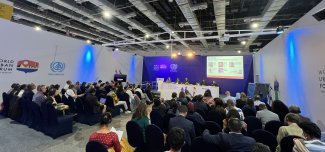Hub for Housing Justice launches at the World Urban Forum in Cairo

The Hub for Housing Justice officially launched on November 7, 2024 at the Twelfth Session of the World Urban Forum (WUF12) in Cairo, Egypt. The launch was celebrated at a vibrant event bringing together key partners and allies, convened by the International Institute for Environment and Development (IIED), Habitat International Coalition (HIC), and United Cities and Local Governments (UCLG). With representatives from wide-ranging organisations and collectives, this event sought to discuss four key propositions that will frame the work of the Hub, how to realise a housing justice agenda, and how to take it forward.
The Hub for Housing Justice is a collaborative initiative led by civil society and research organisations that aim to advance housing justice by framing agendas, sharing resources, synchronising efforts, and promoting learning and action. By advocating through a justice lens, the Hub proposes to transform housing systems through four propositions:
- Anti-discriminatory housing policy and practice
- Radically democratic forms of housing production
- Housing as an infrastructure for more sustainable, caring and fairer cities
- Housing policy and practice that broaden imaginations for housing futures
According to UN-Habitat, at least 2.8 billion people globally are experiencing some form of housing inadequacy. To bring this number down, we cannot rely on market-led solutions. “We all know the direction where we need to go, but something in the opposite direction is happening at a very fast speed” said Lorena Zarate (Co-founder, Global Platform for the Right to the City).
In 2023, UN-Habitat renewed its global commitment to accelerate the transformation of informal settlements and slums. Greg Munro (Director, Cities Alliance) emphasised how the Hub for Housing Justice will be indispensable in facilitating the work of the informality task force to ensure the Global Action Plan is implemented.
It was also clear from the conversation that housing is more than just four walls, it requires infrastructure and services that promote human dignity, safety, and community. Grace Chikumo (President, HIC) described how we “need to look beyond the house, to creating infrastructure that is able to support the existence of housing, as well as creating a community of collective efforts towards housing delivery that makes everyone feel comfortable.”
Despite the clear evidence, research, and solutions, housing injustices continue to be driven by political choices – generating housing systems, policies, and practices that deepen the experiences of injustice worldwide.
We would like to thank our panel for the energy, interventions, and insights they brought to the event: Rodrigo Faria G. Iacovini (Instituto Polis), Lajana Manandhar (ACHR), Grace Chikumo (HIC), Beth Chitekwe-Biti (SDI), Flávio Tavares Brasileiro (General Coordinator Secretaria Nacional de Periferias, Government of Brazil), Albert Lladó (United Cities and Local Governments), Greg Munro (Cities Alliance), Brenda Pérez-Castro (Habitat for Humanity), Francesca Lionetti (UN-Habitat) and Lorena Zárate (Global Platform for the Right to the City). The event was moderated by Alexandre Apsan Frediani (IIED), Camila Cociña (IIED), and Stephanie Butcher (University of Sheffield).
Following its official launch, the Hub for Housing Justice will commence its core activities over the coming months. This will centre around co-designing and framing housing justice agendas, curating and sharing resources related to housing justice, synchronising and aligning efforts and voices, and facilitating opportunities for learning, exchanges and action promoted by the Hub’s partners.

